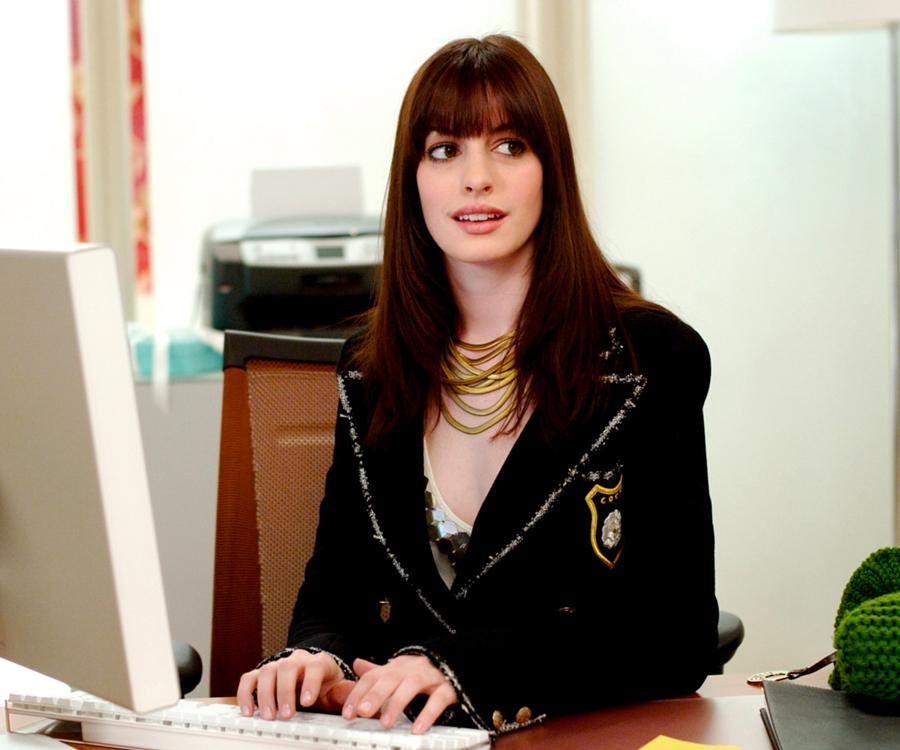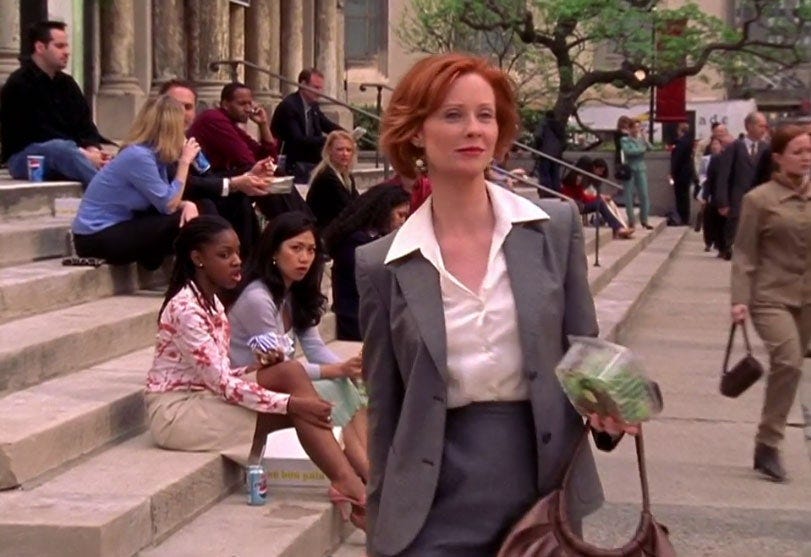Hey everyone! Sorry for the (unintentional) hiatus. Sometimes when you haven’t done something in a while you really start to overthink it, you know? Anyway, I’m back! This week’s issue is not so much about brand – but brands are part of it – and more so about some Gen Z trends I’ve noticed lately.
It’s no secret that Gen Z is nostalgic, specifically for the 90s and early 2000s. But what do we like so much about that era?
No technology. We’re all frustrated with modern-day technology and social media, resulting in a constant feeling of being busy. Twenty to thirty years ago, people didn’t have cell phones! Life was good.
In-person connection. After spending years wearing sweatpants on Zoom, younger generations are hungry for in-person connection and structured, authentic experiences. In the 90s and 2000s, people were hanging out after work, asking each other out at the bar, and talking to baristas!
A favorite Substack writer of mine, of , coined the term ‘corporate fetish,’ which she describes as “when people glamorize the idea of an office—the water cooler conversations, getting dressed (actually dressed, dry-cleaner-pick-up dressed) for an 8-7 job, and spinning around in a desk chair.”
To me, corporate fetish is rooted in nostalgia. When I think of corporate fetish, I think of Andy Sachs in The Devil Wears Prada or Jenna Rink in 13 Going on 30. I think of movies from the early 2000s! Growing up, I envied those characters’ lives and jobs. Even now, I admit that there’s a sliver of me who still wants the lives of those characters – putting on a cute outfit for the office, answering the phone all day, and meeting up with friends at a bar after work. I’m experiencing nostalgia for the romanticized early-2000s movie life. In my head, these films represent the way things used to be, and it looks like things used to be a lot simpler.
I have noticed this trend towards cultivating nostalgic, physical, even corporate experiences in a few different outlets among my Gen Z peer group. Let’s dive into some of them.
Fashion
Media
Location
Fashion
I saw two interesting pieces of fashion news recently:
Uniqlo is doing well among Gen Z women, particularly due to the return to office.
Hermés and other luxury brands are also doing really well with Gen Z right now.
As employers have increasingly required workers to return to the office in the last year or so, corporate fashion is back. Uniqlo has been a successful fit for the space, as the brand strikes the right balance between professional and casual clothing, which is the unofficial dress code in most of today’s workplace environments.
Luxury goods are also big. With the oldest members of Gen Z entering their late 20s, we’re starting to be able to afford luxury pieces, aided by our participation in the secondhand luxury market. Now that we’re headed back to the office and out for drinks, Gen Z is embracing corporate workwear and luxury goods again, leaning into the professional, composed, formal styles that we haven’t worn for so long.
When lots of young people are stuck in less-than-perfect jobs or are reluctant to go back into the office, fashion can be a way to find control, individuality, and joy in a job. With personal style comes a sense of control and power at work that is welcomed in an otherwise challenging period in life for young people.
Media
We can also see the desire for a previous time in Gen Z cultural obsessions with film and television right now. Sex and the City is a constant topic of conversation among myself and my peers. While Carrie might not have had a traditional corporate job, her friends (particularly Miranda) live the quintessential ambitious, career-woman lifestyle that we also saw reflected in rom-coms during the time. Miranda, Samantha, and Charlotte get dressed, go to work, and go out for drinks after work. These shows represent a glamorous New York City lifestyle that Gen Z wishes to recreate to make the most of the traditional 9-5 office lifestyle.
Location
My feed is skewed towards New York City content since I live here, so this might not be the most accurate representation, but I am seeing young people moving in droves to New York City. I think this trend can be attributed to a variety of reasons (globalization, career opportunities, etc.) but there’s no doubt that the pandemic led to an influx of young people wanting to live in NYC. We all got fed up with our childhood homes and craved an exciting, big, scary, ambitious place.
Plus, part of New York’s appeal is its corporate nature. I definitely had an idealized vision of taking the subway, swiping my badge at the office, getting coffee with a coworker, grabbing a Sweetgreen salad, and chatting with friends over happy hour. This city has a strong corporate culture, and given the number of young people who live here or want to move here (despite its ridiculous cost of living), it’s clear that much of Gen Z also glamorizes this city’s corporatized, work-hard-play-hard culture.
Gen Z was deprived of so much connection during the formative pandemic years, that now many of us are embracing all of the experiences – including the office! – that we didn’t have for so long. Additionally, the current frustration among Gen Z with the way that the world works has led us to want things the way they used to be, evident in our fashion choices, media consumption, and location preferences.
What do you think? Have you witnessed these trends (or are you leaning into any of them yourself)? Let me know in the comments, and thanks for reading.







"corporate fetish is rooted in nostalgia" -- this is so true!
I can't speak to the New York part of it, but as a college senior, I definitely see many of my friends glamorizing the start of an in-office career, and certainly turning away from fully remote options. I think this is for exactly the reasons you described - feelings of ambition, independence, wanting to live a "real" life, as opposed to a digital one. Also (and this is probably only relevant for younger people) but the office represents an opportunity to cultivate friendships at work (also the work crush, which Emily has written about, too). On the other hand, I also know people who want to delay office work as long as possibly by taking extra degrees, travelling, etc. Overall though, consensus seems to be that, office or not, young people do want to go back to living life IRL.